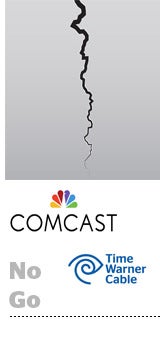 The $45 billion Comcast-Time Warner Cable (TWC) deal is officially kaput.
The $45 billion Comcast-Time Warner Cable (TWC) deal is officially kaput.
If the merger had materialized, it would have created an unsurpassable media and cable conglomerate with massive audience reach.
From day one, regulators were wary about one company controlling too much broadband access, resulting in Comcast terminating the deal Friday.
“Today, we move on,” said Comcast chairman and CEO Brian Roberts in a statement. “Of course, we would have liked to bring our great products to new cities, but we structured this deal so that if the government didn’t agree, we could walk away.”
Although it’s tough to predict TWC’s next moves, industry experts foresee things shaking out a couple of ways.
Dave Morgan, founder and CEO of TV audience activation platform Simulmedia, said he expects the failed merger could breed two well-scaled terrestrial cable companies: Comcast and Charter Communications, which would appear to be in a position to buy some or all of TWC given it lost its bid for TWC to Comcast in the first place.
“Both of them will be big investors in audience data targeting and measurement capabilities and technologies,” Morgan said.
As a result, other TV networks could be pressured to step up their game and make data a bigger part of their businesses, a development already underway as evidenced by 21st Century Fox’s investment in video ad platform true[x].
But cable nets are also pressured by digital platforms.
To effectively compete with Google and Facebook, who are each pushing their video assets and content sharing agreements with other publishers, Videology chairman and CEO Scott Ferber said multichannel video programming distributors must find consumer-friendly ways to leverage their data.
“We have tons of data that shows different content yields different results … but that said, there is momentum for audience-first strategies, which will hurt traditional media companies’ ad dollars if they [themselves] don’t develop these audience solutions quickly enough,” Ferber said.
Comcast is largely viewed as a leader in TV audience and publisher platform development. On the sell side, it owns FreeWheel, a technology platform and ad server enabling top-tier broadcasters to match their audience data sets to that of the advertisers and has been rumored to be in talks to acquire addressable TV ad-targeting firm Visible World.
On the consumer end, Comcast’s Xfinity X1 platform is a full-blown entertainment operating system that is powering Comcast’s migration toward fully IP-based delivery, according to Jim Nail, a principal analyst for Forrester.
“Comcast has just invested a lot more [in its platforms] and I don’t think TWC has done that to the same extent and none of the remaining [MVPDs] necessarily have the capital to move in that direction,” he added.
TWC might argue it has also invested in audience-targeting technology.
During last year’s upfronts, Time Warner Cable Media rolled out a cross-screen tool called Audience Select that promised advertisers access to more than just demo targets – like buyers in affluent geos who shop on certain days. TWC also announced in-house creative agency Kernel to help marketers on the content portions of their addressable campaigns.
“Comcast would have benefited greatly from [TWC’s] scale and geography, but TWC has more work to do to stay relevant,” Ferber said. “Content plus data plus distribution will win. Google and Facebook have the data and distribution, so if they get content right, watch out.”














